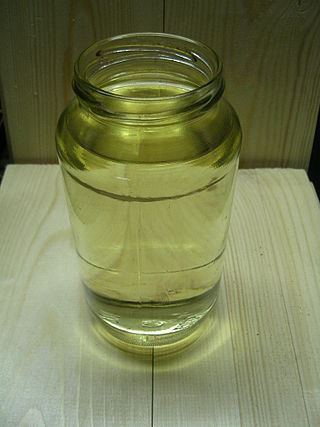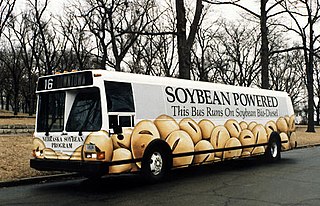Mobil is a petroleum brand owned and operated by American oil and gas corporation ExxonMobil. The brand was formerly owned and operated by an oil and gas corporation of the same name, which itself merged with Exxon to form ExxonMobil in 1999.

Gasoline or petrol is a petrochemical product characterized as a transparent, yellowish, and flammable liquid normally used as a fuel for spark-ignited internal combustion engines. When formulated as a fuel for engines, gasoline is chemically composed of organic compounds derived from the fractional distillation of petroleum and later chemically enhanced with gasoline additives. It is a high-volume profitable product produced in crude oil refineries.
Standard Oil Company, Inc., was an American oil production, transportation, refining, and marketing company that operated from 1870 to 1911. At its height, Standard Oil was the largest petroleum company in the world, and its success made its cofounder and chairman, John D. Rockefeller, among the wealthiest Americans of all time and among the richest people in modern history. Its history as one of the world's first and largest multinational corporations ended in 1911, when the U.S. Supreme Court ruled that it was an illegal monopoly.

A filling station is a facility that sells fuel and engine lubricants for motor vehicles. The most common fuels sold in the 2010s were gasoline and diesel fuel.

Saudi Aramco, officially the Saudi Arabian Oil Group or simply Aramco, is a state-owned petroleum and natural gas company that is the national oil company of Saudi Arabia. As of 2022, it is the second-largest company in the world by revenue and is headquartered in Dhahran. It has repeatedly achieved the largest annual profits in global corporate history. Saudi Aramco has both the world's second-largest proven crude oil reserves, at more than 270 billion barrels, and largest daily oil production of all oil-producing companies.

Imperial Oil Limited is a Canadian petroleum company. It is Canada's second-largest integrated oil company. It is majority-owned by American oil company ExxonMobil, with a 69.6% ownership stake in the company. It is a producer of crude oil, diluted bitumen, and natural gas. Imperial Oil is one of Canada's major petroleum refiners and petrochemical producers. It supplies Esso-brand service stations.
Ethanol, an alcohol fuel, is an important fuel for the operation of internal combustion engines that are used in cars, trucks, and other kinds of machinery.

Marathon Petroleum Corporation is an American petroleum refining, marketing, and transportation company headquartered in Findlay, Ohio. The company was a wholly owned subsidiary of Marathon Oil until a corporate spin-off in 2011.

Bayway Refinery is a refining facility in the Port of New York and New Jersey, owned by Phillips 66. Located in Linden and Elizabeth, New Jersey, and bisected by Morses Creek, it is the northernmost refinery on the East Coast of the United States. The oil refinery converts crude oil into gasoline, diesel fuel, jet fuel, propane and heating oil. As of 2007, the facility processed approximately 238,000 bbl/d (37,800 m3/d) of crude oil, producing 145,000 bbl/d (23,100 m3/d) of gasoline and 110,000 bbl/d (17,000 m3/d) of distillates. Its products are delivered to East Coast customers via pipeline transport, barges, railcars and tank trucks.
The economic effects of Hurricane Katrina, which hit Louisiana, Florida, Texas and Mississippi in late August 2005, were far-reaching.

Humble Oil and Refining Co. was an American oil company founded in 1911 in Humble, Texas. In 1919, a 50% interest in Humble was acquired by the Standard Oil of New Jersey which acquired the rest of the company in September 1959. The Humble brand was used by Standard Oil of New Jersey until 1973, when the company rebranded nationwide as Exxon and discontinued Humble, along with its other brands Esso and Enco.

National Iranian Oil Refining and Distribution Company (NIORDC) is part of the Ministry of Petroleum of Iran. NIORDC was established on 8 March 1991 and undertook to perform all operations relating to refining and distribution of oil products.

The usage and pricing of gasoline results from factors such as crude oil prices, processing and distribution costs, local demand, the strength of local currencies, local taxation, and the availability of local sources of gasoline (supply). Since fuels are traded worldwide, the trade prices are similar. The price paid by consumers largely reflects national pricing policy. Most countries impose taxes on gasoline (petrol), which causes air pollution and climate change; whereas a few, such as Venezuela, subsidize the cost. Some country's taxes do not cover all the negative externalities, that is they do not make the polluter pay the full cost. Western countries have among the highest usage rates per person. The largest consumer is the United States.

Vegetable oils are increasingly used as a substitute for fossil fuels. Vegetable oils are the basis of biodiesel, which can be used like conventional diesel. Some vegetable oil blends are used in unmodified vehicles, but straight vegetable oil often needs specially prepared vehicles which have a method of heating the oil to reduce its viscosity and surface tension, sometimes specially made injector nozzles, increased injection pressure and stronger glow-plugs, in addition to fuel pre-heating is used. Another alternative is vegetable oil refining.

Coryton Refinery was an oil refinery in Essex, England, on the estuary of the River Thames 28 miles (45 km) from central London, between Shell Haven Creek and Hole Haven Creek, which separates Canvey Island from the mainland.
The Renewable Fuel Standard(RFS) is an American federal program that requires transportation fuel sold in the United States to contain a minimum volume of renewable fuels. It originated with the Energy Policy Act of 2005 and was expanded and extended by the Energy Independence and Security Act of 2007. Research published by the Government Accountability Office in November 2016 found the program unlikely to meet its goal of reducing greenhouse gas emissions due to limited current and expected future production of advanced biofuels.

ExxonMobil Corporation is an American multinational oil and gas corporation and the largest direct descendant of John D. Rockefeller's Standard Oil. The company, which took its present name in 1999 per the merger of Exxon and Mobil, is vertically integrated across the entire oil and gas industry, and within it is also a chemicals division which produces plastic, synthetic rubber, and other chemical products. ExxonMobil is headquartered near the Houston suburb of Spring, Texas, though officially incorporated in the U.S. state of New Jersey. It is the largest United States-based oil and gas producing company. ExxonMobil is also the eighth largest company in the world by revenue and the third largest in the US.

Petroleum has been a major industry in the United States since the 1859 Pennsylvania oil rush around Titusville, Pennsylvania. Commonly characterized as "Big Oil", the industry includes exploration, production, refining, transportation, and marketing of oil and natural gas products. The leading crude oil-producing areas in the United States in 2023 were Texas, followed by the offshore federal zone of the Gulf of Mexico, North Dakota and New Mexico.

Petroleum refining in the United States in 2013 produced 18.9 million barrels per day of refined petroleum products, more than any other country. Although the US was the world's largest net importer of refined petroleum products as recently as 2008, the US became a net exporter in 2010, and in 2014 was the largest exporter and the largest net exporter of refined petroleum. As of January 2019, there were 135 operating refineries in the US, distributed among 30 states.
ExxonMobil, an American multinational oil and gas corporation presently based out of Texas, has had one of the longest histories of any company in its industry. A direct descendant of John D. Rockefeller's Standard Oil, the company traces its roots as far back as 1886 to the founding of the Vacuum Oil Company, which would become part of ExxonMobil through its own merger with Mobil during the 1930s. The present name of the company comes from a 1999 merger of Standard Oil's New Jersey and New York successors, which adopted the names Exxon and Mobil respectively throughout the middle of the 20th century. Because of Standard Oil of New Jersey's ownership over all Standard Oil assets at the time of the 1911 breakup, ExxonMobil is seen by some as the definitive continuation of Standard Oil today.














